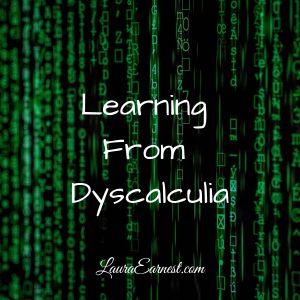
Learning From Dyscalculia
It started as an innocent conversation with a friend of mine. In the process of getting her three gifted children tested for learning disabilities, she was diagnosed with one herself. We were talking about dyslexia, and I mentioned in passing that numbers jump around on me. She looked at me for a moment and suggested that I get tested. I protested that I have never had a problem reading, but she told me there are other learning disabilities, including dyscalculia.
And thus the journey started.
Learning Disability vs Learning Difference (LD)
Most educators and parents will refer to these things as learning disabilities. Growing up with a wheelchair-bound relative, I opt to follow my aunt’s example and call “disabilities” “differences”. I will use “difference” throughout the rest of this article.
Midlife LD Diagnosis
After my conversation with my friend, I did some research. Then I talked to a teacher with both gifted and special education endorsements. Then I talked to a psychologist.
The informal tests indicate the strong possibility (95%) that I have a learning difference called dyscalculia.
After talking to the psychologist and another teacher friend, I decided not to spend the money on an official diagnosis. The cost would not be covered by insurance, and an official diagnosis would get me nothing other than an official label. They can’t medicate dyscalculia, and when I look at my life, I have already developed good coping mechanisms.
(A test similar to one I was given can be found here)
What is Dyscalculia?
Dyscalculia is often called “dyslexia of numbers” because so many people with the condition have numbers switch around on them.
But it also impacts everything from being able to tell left from right to spatial abilities to time quantification to estimation to the math fact understanding to being able to do any math at all.
Like other LDs, dyscalculia is a spectrum. The severity ranges from mild to severe, meaning that someone with a mild difference will be able to do things that are beyond someone with a severe case. But all cases can be helped with strategies, just as with other LDs.
The Signs Were All There…
As I look back across my life, the signs were all there from a very early age. I had difficulty with crawling and walking (left-right differentiation). My mother spent three years with flashcards and recitations to get me to learn my math facts. I struggled with the concepts in geometry – and geometry was the reason I had to take the math Praxis (teacher exam) twice.
My high school geometry teacher told me I shouldn’t bother with taking more math, and my chemistry teacher told my father he felt I would be happier in other classes. Both of these were directly related to difficulties with spatial and math concepts.
The effects have followed me into adulthood: I can’t pack a suitcase and I can’t estimate the best size container for leftovers. I have broken three toes by misjudging the space between me and a solid object. I have done every math problem ever presented to me at least twice – three times if the first two answers didn’t agree. I consistently mix up digits, particularly if I am reading them from one place and writing them in another. I can’t remember phone numbers or birthdates. I struggle with estimating time. If I am tired, I struggle with my percussion sticking due to the left-right issue.
I even told my math students that they needed to make sure I didn’t copy numbers incorrectly – and offered a candy prize if they caught a mistake.
…But I Am Good At Math
The main reason I chose not to pursue further help is that I have managed to find ways to cope with my issues.
I have a bachelor’s degree in electrical engineering, a state license to teach all high school math (from algebra through calculus), and I work in computers.
I have managed to learn on my own how to compensate for my issues. My desire to work in computers pushed me in college to retake some of my high school math (I had done poorly on the entrance exam) and I had a spectacular professor who restored my confidence that I could do math.
I do all math problems at least twice – but I am very fast at them. I have memorized all math facts so that the answer is automatic. I have people read me digits if it is really important that I get it right; or I drag my finger along the numbers so that I only see one digit at a time; or I type the numbers twice and make sure the digits line up. I do all of my math for timesheets and finances in spreadsheets.
I have learned that leftover containers are not that big of a deal. I write down all birthdates and phone numbers in my phone or on a scrap piece of paper and read the information back. I have to make sure that if I am walking I am not thinking about anything other than navigating my body through space.
I rely on my phone and computer for alarms to keep me on track and on schedule.
I Am Angry
I won’t lie. I am grappling with the fact that I have had this issue since very early on, and no one caught it for decades. It makes me angry, but at the same time, growing up in northern Wisconsin when I did, the school system wouldn’t have been able to handle it even if they recognized it. They didn’t recognize or treat dyslexia either.
But what makes me most angry is that I am a math teacher and no one ever mentioned this during my training. We learned about dyslexia and ADHD. But not the one thing that would impact my students directly. Looking back, do I suspect some of my students had this? Absolutely. And I wasn’t given the basic information to be able to recognize it or help them.
Why Am I Talking About This?
When I told a close friend I was going to write this post, she side-eyed me. “What’s the point?” she asked.
I am coming forward with this because there is little information or recognition of this learning difference. Yet it is estimated that this affects between 10 and 15% of the population.
Many people don’t find ways to compensate for their differences. My going public with my difference is to raise awareness and to share some of the strategies that I have learned. Having this learning difference doesn’t mean that the person is stupid, but most people with it feel stupid.
I am also talking about it because some of my strategies can be useful for those who do not have an LD. I can share not only what I do, but why it works.
I think that it is also important for my readers to understand that the productivity topics I write about – time management especially – doesn’t come naturally or easy to me, so everything that I write about I have already tried out to see if it works.




